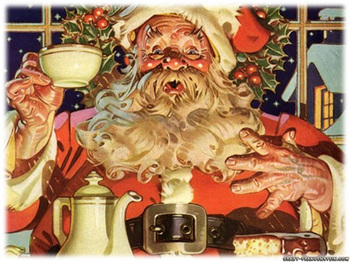
Food is going to be a major theme in many Western families over the next week or so. While the original Santa, a
reindeer shaman, was probably a lean and wiry fellow, our holiday habits have projected a copious belly onto this beloved seasonal gift-giver. This seems the right season to examine how we dream of food.
Say you dream of consuming sugar feasts of candy or chocolate or over-the-top whipped-everything desserts. The first thing to consider – after you check your morning-after feelings (guilt or pleasure or a mix of both, perhaps) – is how the preferences of your dream self compare with those of your waking self. If both of you have a sweet tooth, maybe you’re simply doing in your dream what you’d do anywhere else, or rehearsing for that special dinner. But maybe your dream self is overdoing it to the point where you might pause to ask yourself: do I need to cut back a bit? This could be an example of how the way we eat in dreams can offer course correction.
Or maybe you have a sweet tooth, but you’re on a diet and are restricting your sugar intake. Then we might look at the same dream a different way, as compensation. Your dreams are allowing you pleasure and comfort you have denied yourself, and you don’t have to pay in calories.
Then again, you might be one of those who couldn’t care less about chocolate or dessert in regular life – but there you are, downing that cake and spun sugar and whipped cream. We might now want to look at the same dream content in a different, symbolic way, asking: what pleasure or experience (other than food) are you hungry for?
Dreams of food and eating are often social dreams, and our role in them can be quite illuminating about our connection – or lack of connection – with others and our readiness to give or receive. A potluck dream dinner, or one in which everyone is helping out in the kitchen, might reflect a happy and harmonious community or family. If someone else is feeding us, we want to check whether we are actually enjoying the fare. We may need to ask, “Who is trying to make me swallow something I don’t want?”
Some dreamers never seem to get to the restaurant, or the table, like the characters in Buñuel‘s surreal movie The Discreet Charm of the Bourgeoisie. The question becomes, “What am I missing out on?” Or the dreamer is kept waiting in a line or at a counter where she is never served. The question, this time, may be: “In what sense am I at a place in life where I am not being fed or nourished?” Asking that question, of a dream of this kind, once inspired a woman I know to leave her marriage.
Our food dreams can be very direct advisories on diet and nutrition and taking care of our bodies. If you are throwing out food in a dream, for example, that may be a prompt to eliminate that food from your diet. If you are putting food in a freezer, that could be a nudge to cut back on that food for a certain period of time. Our dream producers will hype a theme and use special effects to get this kind of point across. At a time in my life when I was eating quite a lot of fried and fast food, I dreamed I was driving at crazy speed until I flew off the road and stopped – safely – at the entrance to an Asian market featuring organic and vegetarian items.
Food, as a dream symbol, can be a stand-in for many things. The range is reflected by how we use words like “food” and “hunger” in everyday conversation. Something can be food for thought or food for spirit; we can be hungry for meaning or hungry for love. As we seek the meaning of a food dream, it will always be appropriate to ask “What is being fed (or not fed)?” and “What does the dreamer hunger for?”
The
state of food preparation in dreams may be symbolic of what we are cooking up in a different sense. I find that, whenever I am working on a book, my kitchen dreams mirror my progress (or lack of progress) rather exactly. In the late 1990s, for example, I dreamed that I was in a kitchen where the counter and the tiny table are
both littered with dirty dishes, paper plates, and odd pieces of china. I started piling plates up and clearing this out of the way, to make room to eat a huge steak I had ordered in. At the time, I was working on the book but had hit a speed bump. The dream gave me clarity about the need to clear space
for what I wanted to serve up, and the “huge steak” reminded me (on the sounds-like principle) that there were “big stakes” involved.
Then there is the Exotic Foods category. Contemporary dreamers, like the ancients, dream of eating books, a rather powerful metaphor for absorbing knowledge. They also eat shoes, lumps of incense, crystals, statues and minor deities, as well as yucky things – bugs and maggots and shit – they would be just as unlikely to eat in normal life. The basic question, with all these varieties, is likely to be: What am I bringing in to my body and my life, and is it good for me?
Our inner senses can come richly alive in our food dreams. I know dreamers who talk about dream banquets, even thirty years on, as the most wonderful meals of their lives. I think of sensual dreams in which we don’t need Freud to tell us that what’s going on with certain foods is very sexy. Of a delicious dream of stirring a pot of peach conserves. Of a wildly funny dream recently shared with me by a woman who found herself having a bouncy romp in a tub of red potatoes.
As I write, I can taste the perfect lemon sorbet and fine champagne I once enjoyed in a cafe that seemed to be in the astral realm of the moon. And now I am smacking my lips as the remembered taste of raspberry juice plays with my palate. Years ago, I woke from a dream certain that raspberry juice was spilling down my lips, from a bittersweet love scene at the Gare du Nord in Paris, apparently on the eve of Nazi occupation, in which my dream lover and I shared a kiss with raspberries in our mouths.
Santa image from crazy frankenstein


-thumb-310x307-20562.jpg)